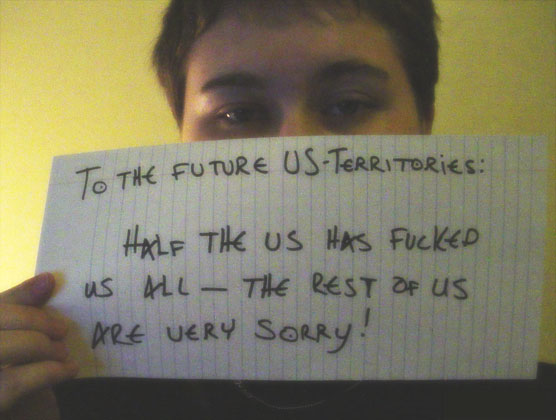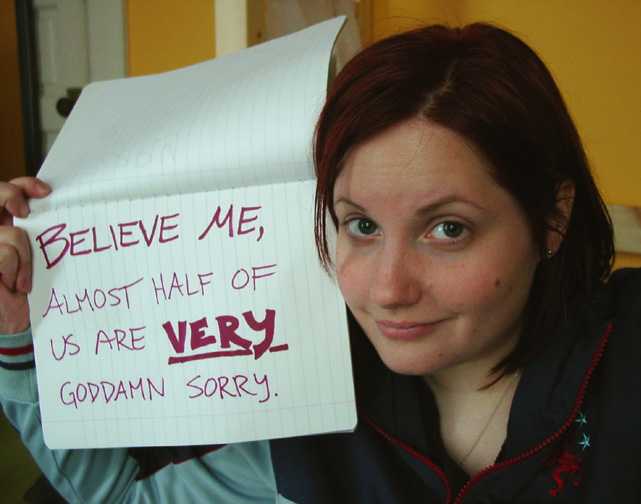Harries accepts Dawkins' idea that morality is part of our nature, but he still thinks that religious people do it better. He still wants to claim the moral high ground and he starts with this musical metaphor:
I do not believe that a society without a religious basis for its morality will always collapse. But I do think that the relationship between morality and religion is more complex than either Dawkins or religious believers usually allow. Take an analogy: someone hears a great piece of music and responds to it in itself. But someone else knows that the piece is part of a symphony and can be even more appreciated when heard as part of the whole in which it has a crucial place. As human beings we can recognize and respond to particular moral insights. But a religious believer claims to understand these as part of a much larger whole in which they have a vital place: in particular, there is a fount and origin of all our moral insights which is good, perfect good, all good, our true and everlasting good. For a Christian, this is above all shown in the willingness of God to enter the flux of history, to redeem it from within.
As always there is this claim that he knows the whole symphony, or sees the bigger picture, even though this religious picture, from my viewpoint, looks smaller and blurrier and dead wrong. This claiming of the moral high ground has had some really nasty and bigoted affects in the past. For example, this Time Magazine article from the 1970s, "Can Atheists Be Parents?" where a judge denied some atheist parents the right to adopt a child because of their lack of belief in a Supreme Being.
When he says that "...someone else knows that the piece is part of a symphony and can be even more appreciated when heard as part of the whole in which it has a crucial place," he is claiming such extra knowledge. How did he get it? Did God tell him? Did he find it in the Bible?
If atheism is true then the moral symphony Harries hears is an illusion. If theism is true then the question of the nature of God and of the symphony still has to be answered to my satisfaction. Speculation about invisible spiritual realms and entities, absent any meaningful test to verify them, is a lousy basis for law and social policy. What role does God play in human moral reasoning? Where is the rest of the symphony? We have only his claim that it exists or that it's what he thinks it is. That part the theistic apologists' argument is always left out. They keep telling us they know more but when forced to describe it they resort to theological doublespeak that has little connection to the world I see.
And how will Bishop Harries explain this example of Christian morality, future toddler chopper Vox Day's blogpost on obeying God.
But the crisis of moral values is such that we should simply recognize and rejoice in the good wherever it is to be found, while continuing to converse about whether it has its place in a larger scheme of things.
But how do you recognize the good? If Catholic hospitals refuse to administer the morning after pill, as emergency contraception, upon request to women who have been raped, is that good? If George Bush vetoes a bill to fund research on embryonic stem cells because he thinks God injects a soul into the embryo on conception that is only good if you think there are souls, otherwise it's destructive superstition that costs needless lives.
That seems to be one of the problems at the heart of religion, it attributes morality to a "law giver" who I don't know and who can change his mind. If there is no cosmic law giver then our morality and our laws have to be based on pragmatic results and common human values, values often denied by religion.
...many people who have strong moral commitments without any religious foundation were shaped by parents or grandparents for whom morality and religion were fundamentally bound up. Moreover, many of those in the forefront of progressive political change, who have abandoned religion, have been driven by a humanism that has been essentially built up by our Christian heritage as Charles Taylor has recently brought out in his magisterial study, A Secular Age. How far are we living on moral capital?
The above is only a distorted half truth. Yes, my morals were shaped by my parents and their morals by my grandparents. They are part of something larger, culture, and it would be correct, in some ways, to call this a "Christian culture." But we can also call our culture an "Enlightenment culture" because we're also a product of the Enlightenment's rebellion against religious rule.
We pick up on the rules for dealing with each other by watching the people around us, not just our parents. We get our morals through culture in many different ways, through friends, movies, novels, news and more. If we grew up in a different culture we would have inherited and learned different "morals," at least as far as they are not universal. Certainly a lot of rules seem arbitrary, like how much clothing we should wear. If I were raised in a Muslim country I might feel uncomfortable around women who expose as much flesh as the women around me do, no matter my beliefs, just because it was unfamiliar. Though, I have a hard time imagining that and I think I'd be okay with women exposing their breasts in public if that change came suddenly.
If I was raised as a Spartan, I'd probably have a Spartan morality -- ready to die in war, thinking weak babies should be thrown off a cliff... If I were raised as a Roman I probably would not object to gladiatorial combat and executions as entertainment (hell, our athletes are killing themselves with steroids and growth hormones already just to get the money rewards of entertaining us).
As society gets more atheistic, if it does get more atheistic, I would expect society to evolve a different set of mores, but slowly and gradually as it is in fact happening now. While no one can predict precisely what changes will evolve, because it will not be one man who chooses but society as a whole, we can still see how our basic values and principles are leading us. Yes, if we accept gay marriage, then we will probably later accept even more varied forms of domestic partnership like men with multiple wives and wives with multiple husbands. We may broaden the definition of family to include large communes where mates are shared.
There are two examples of so-called "atheist societies," China and Russia, that Christians try to present as examples, but they're not really all that atheistic and their histories are more repressive than their current states. And they certainly have a very different take on some moral issues than I do. I can't imagine we'd do what Russia did and prohibit the denial of Santa Claus.
The Russian government has rules for advertisers not to discredit parents and teachers. It seems to be one of those silly rules that protect religion.
China tells Tibet’s living Buddhas to obtain permission before they reincarnate. They can't reincarnation without permission from China’s leaders? How does one explain that kind of rule? It's beyond ridiculous. What a crazy attempt to assert Beijing’s authority over Tibet. The idea that an atheist society would even have a State Administration for Religious Affairs is evidence that so called atheists societies have not yet escaped from religious influences. Tibet’s exiled god-king, the Dalai Lama, is still a threat. They have to deal with the fact that the people cannot easily abandon religion and that they must control this powerful force in people's lives.
People are going to believe what they believe, or disbelieve, and pass those beliefs to their children whether governments like it or not. Such rules will further alienate the Tibetan people. At least the Russians are trying to win the hearts and minds of religious folk, respecting the ancient customs and traditions.
... there is a dark side to our nature that it is sentimental to ignore, one which is still wreaking such terrible havoc. As WH Auden put it: 'We have to love our crooked neighbour with our crooked heart.' This points to the need for both self-knowledge and grace. At the beginning of this new year, with the world so stricken with growing inequality, corruption, decadence and conflict, each of us, believer and unbeliever alike, need all the help we can get.
Sure, there's a "dark side" to our nature that we shouldn't ignore, but good and bad, dark or light, they are determined by your values. Even that "dark" side of humanity that drives some people toward war, crime and murder probably has as much of an evolutionary explanation as the altruism and empathy we've found to be natural in animals and ourselves. All the studies meant to challenge the widespread presumption of religious people that ethics and morals are imparted to humankind by some kind of divine overlord also have to account for our "dark side" too.
Now, who exactly is ignoring the dark side when it is the "Christian" George W. Bush who may have lied us into war, introduced more extreme forms of torture, is ready to put judges on the supreme court who will make laws to punish young girls and doctors for aborting babies, who wanted write an amendment to the constitution to deny gays the right to marry, etc. etc.. His very Christian party, Huckabee's GOP, still supports all this, a country where the president and vice president, like the Spanish Inquisition, have the power to grab an American citizen off of the street, send him to a secret prison, torture him, and detain him indefinitely without him ever hearing the charges against them.
We just might do better without religion in the realm of morality and ethics if this is what we can expect of our Christian leaders.
Bishop Harries isn't alone in wondering about morality in an atheistic society. Even Nietzsche worried about the collapse of morality after Christianity died.
In Nietzsche's view, modern science and secularization had already "killed" the Christian God, who had served as the basis for meaning and value in the West for more than a thousand years. It's one of the things that make Nietzsche the most mentioned atheist philosopher by Christian apologists. They've made Nietzsche more famous than he deserves to be.
Nietzsche said that the "death of God" would eventually lead to the loss of any universal perspective on things and along with it any coherent sense of objective moral truth. Instead we would have multiple, diverse, and fluid perspectives and no one would have a final say on things. Thus begins the half-truths of moral relativism and post-modernism.
Nietzsche was mostly on target when he criticized, but off target when constructive. He had trenchant critiques of Christianity and of philosophers like Plato and Kant. He called himself an immoralist but he did not really want to destroy morality, but rather to reconstruct a new, more naturalistic source of value in the vital impulses of life itself. I think he failed on that count.
Nietzsche wrote in "The Birth of Tragedy," that "Christianity was from the beginning, essentially and fundamentally, life's nausea and disgust with life, merely concealed behind, masked by, dressed up as, faith in 'another' or 'better' life."
Of the everyday Christian Nietzsche wrote, in "Human, all too Human," "If the Christian dogmas of a revengeful God, universal sinfulness, election by divine grace and the danger of eternal damnation were true, it would be a sign of weak-mindedness and lack of character not to become a priest, apostle or hermit and, in fear and trembling, to work solely on one's own salvation; it would be senseless to lose sight of ones eternal advantage for the sake of temporal comfort. If we may assume that these things are at any rate believed true, then the everyday Christian cuts a miserable figure; he is a man who really cannot count to three, and who precisely on account of his spiritual imbecility does not deserve to be punished so harshly as Christianity promises to punish him."
Nietzsche saw it in terms of a master-morality and a slave-morality. The master-morality was associated with Homeric Greece. Value arose as a contrast between what they saw as good and bad. Wealth, strength, health, and power were good. They were the traits found in Homer's heroes. The bad was associated with the poor, weak, sick, and pathetic, traits you supposedly find in Greek slaves.
Slave-morality was a response to master-morality. Nietzsche associated slave-morality with the Jewish and Christian traditions. Good for the slave was charity, piety, restraint, meekness, subservience and obedience. Evil was the cruel, selfish, wealthy, indulgent and aggressive. Nietzsche saw slave-morality as a ploy among the slaves and the weak to overturn the values of their masters and to gain value for themselves. Their religion explained and elevated their moral situation, and at the same time fixed them to a slave's life.
Nietzsche saw slave-morality as a sickness, a derivative and resentful value that worked by condemning others as evil. Nietzsche's approach to philosophy here was psychological, analyzing philosophical ideas not just by their logical form and results, but also by the kind of psychology that produced them. He called for the strong in the world to break their self-imposed chains and assert their own power, health, and vitality on the world. A sort of precursor to Ayn Rand's philosophy. Embrace the "Will to Power."
Nietzsche's "will to power" also looks back at Greek heroes who wanted more than mere survival and who often died young, risking their lives in battle to gain power, glory and greatness. They lead their lives in a strong and vital way.
This attempt at a more constructive philosophy was vague and error prone. In Thus Spake Zarathustra, Nietzsche's character, Zarathustra, says "I teach you the overman. Man is something that shall be overcome. What have you done to overcome him? All beings so far have created something beyond themselves; and do you want to be the ebb of this great flood and even go back to the beasts rather than overcome man? What is the ape to man? A laughingstock or a painful embarrassment."
Nietzsche's Superman, or Overman, does not battle for truth, justice and the American way. Rather, Nietzsche's Superman has battled the Christian values of Nietzsche's day and overcome them. Nietzsche's Superman is not affected by "pity, suffering, or tolerance of the weak." Compassion is a weakness because it allows the weak to restrict the growth of the strong. He determines what is good and what is evil, not allowing religion or society to do it for him.
I disagree with what Nietzsche says in this particular case and his vague ideas will not work in the real world. Take something as simple as obeying the speed limit on the highway, I can not decide for myself what the speed limit is, I almost have to follow the rules of the road or follow the herd to avoid arrest and accidents. If I'm on a road where the speed limit is 50mph and almost everyone around me is going 70mph it might pay to follow the crowd, it certainly lowers my risk of arrest to be part of a group that's breaking the law, or I can decide I feel safer at 50mph and then everyone else becomes a risk to me as they try to get around me. If I do 70mph without the herd or the posted limits justifying it I take a more serious risk to myself and others.
Nietzsche seems to miss the whole point of morality. The plural, "supermen," never appears in Nietzsche's writings and morality is about the group, and more, it's about society and even the whole of humanity, not the individual. It's about how we treat others, how we live together and work together, and there is no one who is not weak when alone and faced by a group. To isolate yourself the way this Superman does will just weaken you. To be a member of any group you have to play by the traditional rules of the group, at least in public.
Why wouldn't Nietzsche's Superman decide to be a murderous criminal? Just to avoid punishment? Why should I trust Nietzsche's Superman in a business deal if he sees me only as member of a herd he doesn't belong to? A moral person has to see the bigger picture and his self interest has to be enlightened by an awareness of the fact that he is part of a society that he depends on. He has to know that the trust of others has value.
Nietzsche is not totally bogus. It encourages independent thinking by discouraging people from following "the herd" or accepting the values of society unquestionably. But what has to be questioned is the group, and it must be questioned in public by those who understand what is at stake and are solid members of the group who have earned our trust. We question morality by asking about the pragmatic results and which common human values are supported by the rules. It is on these grounds we challenge the priests who tell us gay marriage is wrong, abortion is wrong, etc..










